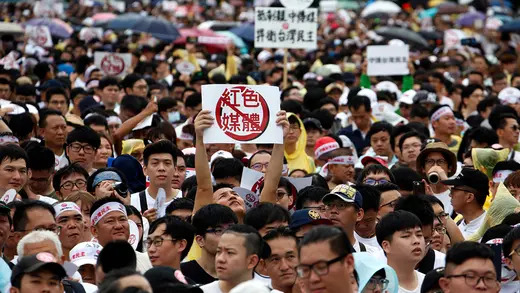How China Is Interfering in Taiwan’s Election
Beijing is spreading disinformation to influence Taiwan’s election in January, but that doesn’t necessarily mean President Tsai Ing-wen will get voted out.
By experts and staff
- Published
Experts
![]() By Joshua KurlantzickSenior Fellow for Southeast Asia and South Asia
By Joshua KurlantzickSenior Fellow for Southeast Asia and South Asia
With Taiwan’s presidential election approaching, China’s aggressive disinformation campaign appears to be in full force. Its strategy seems designed to sow confusion on the island and tilt the race against incumbent Tsai Ing-wen and in favor of Beijing’s apparently preferred candidate.
How is China spreading disinformation?
China has a long history of meddling in Taiwan. It allegedly used disinformation in Taiwan’s local elections in 2018 and continues to deluge the island with disinformation. A report by V-Dem, a program at the University of Gothenburg in Sweden that assesses democracies, found that Taiwan is subjected to more disinformation [PDF] from Beijing and other governments than any other place in the world. These campaigns use fake news stories, bots and falsified social media accounts, and propaganda, among other tactics, to manipulate and deceive recipients.
China’s approach mixes several strategies:
- Hackers and bots spread disinformation through social media platforms such as Facebook, microblogging services such as Weibo, and popular chat apps such as Line. For instance, Chinese media outlets disseminated a false story in 2018 claiming that Su Chii-cherng, a Taiwanese diplomat in Japan, failed to help Taiwanese people trapped during a typhoon. The stories were widely shared in Taiwan, and Su later took his own life, noting in a letter that he had been troubled by the viral posts.

- Beijing is increasing its control over Taiwanese media as pro-China tycoons buy media outlets there. Earlier this year, Taiwan’s National Security Bureau divulged that several Taiwanese media outlets collaborate with the Chinese Communist Party. Some of these outlets, including the powerful Want Want China Times Media Group, also coordinate with the Chinese government’s Taiwan Affairs Office, the Financial Times reported. Other Taiwanese websites appear to publish Chinese propaganda.
- Additionally, China reportedly launches tens of millions of cyberattacks per month in Taiwan.
What are Beijing’s goals?
Taiwanese citizens will vote on January 11 for either President Tsai of the Democratic Progressive Party (DPP) or Han Kuo-yu of the opposition Kuomintang (KMT). There is no doubt that China prefers the opposition, as it appears to be spreading disinformation in Han’s favor.
The KMT historically has been willing to accept that Taiwan and China are part of the same country. Han, the mayor of Kaohsiung, Taiwan’s second-most-populous city, has supported stronger cross-strait relations and has held meetings in China with Communist Party officials in recent months.
Meanwhile, the DPP has been known for having the toughest China policy of any Taiwanese party. Tsai has pushed Taiwan to become less financially dependent on China, and in an October speech, she called on Taiwanese to “defend ourselves,” labeling China a threat to regional security.
More generally, Beijing uses disinformation to undermine the island, including by weakening Taiwan’s institutions, chipping away at public trust in its leaders, demoralizing its citizens, and causing confusion.
What’s been the Taiwanese government’s response?
The government is trying to keep the playing field level. Recently, Taiwan’s media regulator has fined outlets for giving Han the majority of coverage, but it has only had modest success. The government also created an elite police task force on misinformation and banned several Chinese video-streaming services out of fear they could be used to spread false stories.
At the same time, global tech companies are upping their scrutiny of Chinese efforts in the region. In August, for example, Facebook and Twitter banned hundreds of thousands of China-linked accounts suspected of spreading disinformation about Hong Kong.
While these steps modestly reduce China’s power, disinformation will surely continue to be rampant leading up to the election.
Will China’s efforts succeed?
China’s strategy appears to have worked in Taiwan’s local elections last year. Kaohsiung had been a DPP stronghold, and Han had been a longtime, relatively undistinguished KMT politician, but pro-China media helped Han win. Then, ahead of the KMT’s presidential primary in July, pro-China television channels featured him constantly, and he won that race as well.
But Chinese efforts could backfire. Monthslong protests in Hong Kong have hurt China’s image in Taiwan, potentially making it harder for Beijing to wield influence over the island and boosting Tsai’s standing. Moreover, hundreds of thousands of Taiwanese have protested against Chinese financial support for Taiwanese media. Given Tsai’s current lead in the polls, Taipei’s efforts to crack down on disinformation, and continued widespread outcry over Hong Kong, Beijing may not get the result it wants in January.
